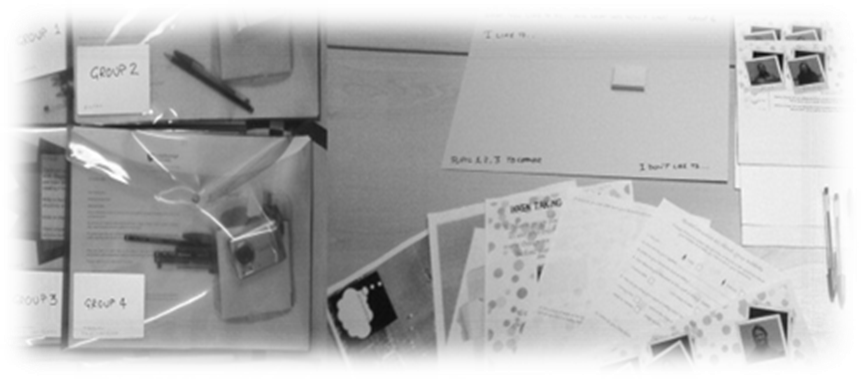Once a background literature review has been done, unanswered questions may be investigated using product cultural probes (see example figure) and observation, for example, using ethnography, system or task analysis (Cohen et al 2007). More specific questions may be posed to samples of the target market or end users through questionnaires, interview, teleconferencing (Torrens 2011) or focus groups (Morgan 1997).
Product/cultural probes have been used successfully by a number of researchers eliciting information from individuals and groups over a longer time period. (See Figure) Probes often consist of a diary that may be recorded in a number media. Written, drawn, photographic and video recorded evidence provides the NPD team with information-rich evidence into the daily living activities of individuals or social groups. It may also contain activities, tasks or questionnaires to be filled in periodically by the participants.
This form of ethnographic inquiry is less intrusive than a researcher being a ‘fly on the wall’; however, it would require a pilot study to ensure the balance between media recording formats, tasks and questions were appropriate and viable to obtain from the target user group.
Supporting site visits by designers (when participants are not at the location) are essential as they help them construct and better interpret the probes. These visits will also enhance the understanding of the environment in which their product will be used, without needing to gain ethical approval to meet with participants directly.

Useful links
Cohen, L. Mannion, L., Morrison K. 2007. Research methods in education. 6th ed. London, New York: Routledge.
Torrens, GE (2011) Universal Design: empathy and affinity. In Karwowski, W, Soares, M, M, Stanton, A, N, Eds, (ed) Handbook of Human Factors and Ergonomics in Consumer Products, CRC Press, pp.233-248 Available at: (http://www.crcnetbase.com/doi/abs/10.1201/b10950-19), Accessed: [23/09/015]
Torrens, G.E., 2012. Assistive Technology product to Universal design: A way forward, Design For All India, 7 (7), pp.182-205 Available at: (https://dspace.lboro.ac.uk/dspace-jspui/handle/2134/15736), Accessed:[23/09/2015]
